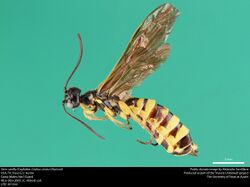Biology:Cephus cinctus
From HandWiki
Short description: Species of sawfly
| Cephus cinctus | |
|---|---|

| |
| Scientific classification | |
| Domain: | Eukaryota |
| Kingdom: | Animalia |
| Phylum: | Arthropoda |
| Class: | Insecta |
| Order: | Hymenoptera |
| Family: | Cephidae |
| Genus: | Cephus |
| Species: | C. cinctus
|
| Binomial name | |
| Cephus cinctus Norton, 1872
| |
Cephus cinctus, also known as wheat stem sawfly,[1] is a slow flying, yellow and black coloured, destructive pest found mainly in western North America.[2][3]
Habit and habitat
The adult fly grows to a length of 7 to 12 mm. Males are considerably smaller than females. However, they are delicate and short lived.[2]
Host
The species has a wide host range that includes all large-stemmed grasses except oats, Avena sativa L. (Macedo et al. 2005a).[2][3]
Distribution
It is known as a chronic pest in Northern Great Plains of the United States and also an important pest of wheat in the Canadian Prairies.[4] The species is distributed widely in various regions of the US and Canada.[3]
References
- ↑ "Animal Diversity Web". University of Michigan, Museum of Zoology. http://animaldiversity.ummz.umich.edu/accounts/Cephus_cinctus/classification/.
- ↑ 2.0 2.1 2.2 "Sawflies: the wheat stem sawfly Cephus Cinctus and relatives". http://www.agric.wa.gov.au/objtwr/imported_assets/content/pw/ins/pp/gc/fs012_2004.pdf.
- ↑ 3.0 3.1 3.2 "Diagnostic Methods for Wheat-stem sawfly". plant biosecurity ToolBox. http://old.padil.gov.au/pbt/index.php?q=node/70&pbtID=221.
- ↑ Cárcamo, Héctor; Entz, Toby; Beres, Brian (2007). "Estimating Cephus cinctus wheat stem cutting damage – can we cut stem counts?". Journal of Agricultural and Urban Entomology 24 (3): 117–124. doi:10.3954/1523-5475-24.3.117. http://www.bioone.org/doi/abs/10.3954/1523-5475-24.3.117?journalCode=jaue.
Further reading
- Holmes, N. D. (1977). "The effect of the wheat stem sawfly, Cephus cinctus (Hymenoptera: Cephidae), on the yield and quality of wheat". The Canadian Entomologist 109 (12): 1591–1598. doi:10.4039/ent1091591-12.
- Holmes, N. D. (1982). "Population dynamics of the wheat stem sawfly, Cephus cinctus (Hymenoptera: Cephidae), in wheat". The Canadian Entomologist 114 (9): 775–788. doi:10.4039/ent114775-9.
- Holmes, N. D.; Peterson, L. K. (1961). "Resistance of Spring Wheats to the Wheat Stem Sawfly, Cephus cinctus Nort. (Hymenoptera: Cephidae): I. Resistance to the Egg". The Canadian Entomologist 93 (4): 250–260. doi:10.4039/ent93250-4.
- RJ, Bartelt (Feb 2002). "Cuticular hydrocarbons and novel alkenediol iacetates from wheat stem sawfly (Cephus cinctus): natural oxidation to pheromone components.". Journal of Chemical Ecology 28 (2): 385–405. doi:10.1023/A:1017994410538. PMID 11925075.
Wikidata ☰ Q14499259 entry
 |

